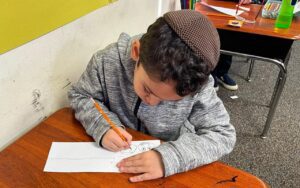 In the world of Chinuch, we are always thinking of long-term goals. Our decisions and investments must always be based on big-picture objectives of where we want to go, not just a few months or years from now, but for generations.
In the world of Chinuch, we are always thinking of long-term goals. Our decisions and investments must always be based on big-picture objectives of where we want to go, not just a few months or years from now, but for generations.
When Rabbi Osher Farkash set out to become a Mechanech, he turned to his Mashpia and asked him “What advice can you give me?” His Mashpia replied, “When you look at an individual student don’t get caught up in the minutia. Don’t see this bochur as someone who came late to Chassidus and you need to start arguing with him about it. View this bochur as someone who is like an entire city or even a country and treat him with that long lens view that he contains multitudes.” In Chabad, it is true that many of our students who graduate from our yeshivas and seminaries do go on to have tremendous influence over big cities and even countries. It is a sacred responsibility that our Mechanchim have to educate the future movers and shakers of the world. And even for a child who will not be the Shliach of a big city, that student may be the one to do the Mitzvah that will bring Moshiach.
I recently heard a story from my friend Rabbi Eli Posner about his grandfather, Reb Zushe Posner, A”H. Before Reb Zushe passed away, a former student came to visit him and asked, “do you recognize me?” Reb Zushe, who at this point had a hard time speaking, motioned to his ears as if to ask the man if he used to have long Payos as a child. The man confirmed that he did, and Reb Zushe smiled and said, “Yes, I remember you.”
The man had come from a non-Lubavitch family yet as a bochur, he wanted to go to a Chabad yeshiva. But his learning skills were not up to par and the Hanhola did not want to accept him. Reb Zushe, who was then a young bochur, turned to the Hanhola and said “I was sent by the Rebbe to teach. The Rebbe did not specify that only smart kids or only Lubavitch kids should learn. I am here to teach everybody.” The Hanhola relented and accepted the boy. 65 years later the man, who now has a Chasidishe family of children and grandchildren, sought out Reb Zushe before he passed away to say thank you.
A new generation of Chabad Chasidim was created thanks to one Bochur’s determination to teach.
The recent passing of Rabbi Edelstein זצ”ל reminded me of my grandfather, Rabbi Mordechai Eliyahu Shneur. In 5692, when he was a young bochur in Klimovitch, he was approached by a father who asked him to teach his two sons. My grandfather diligently taught these two children for a few years before they all emigrated to Eretz Yisrael. These two students both became great leaders: one, Rabbi Edelstein זצ”ל, esteemed Rosh Yeshiva of Ponovezh and Gadol of Torah, and the other, his brother, Rav Yaakov Edelstein, who was a Rav in Central Israel. For as long as my family could remember, the Rav would visit my grandfather every year on Chol HaMoed to fulfill the Mitzvah of visiting one’s teacher. What this taught me is that Chinuch leaves a permanent impact. Those few years of study in Klimovitch led to a lifetime of leadership and connection. Teachers must see their students as the future Gedolei Yisroel.
This year, MEF started a series of interviews highlighting Mechanchim in Chabad Moisdos. One that stood out to me was Rabbi Eily Smith who describes the experience of accepting bochrim to Yeshiva who others did not want to take and finding that these students succeeding was the greatest nachas of all.
In Chinuch, no child can be left behind.
This is our moment in Chinuch to think long-term, think big, and include every single child in that vision. When we think broadly, that is when we will see the greatest Hatzlacha.




